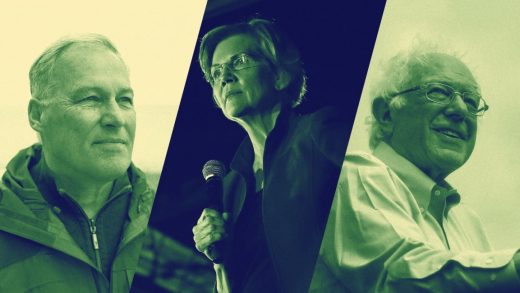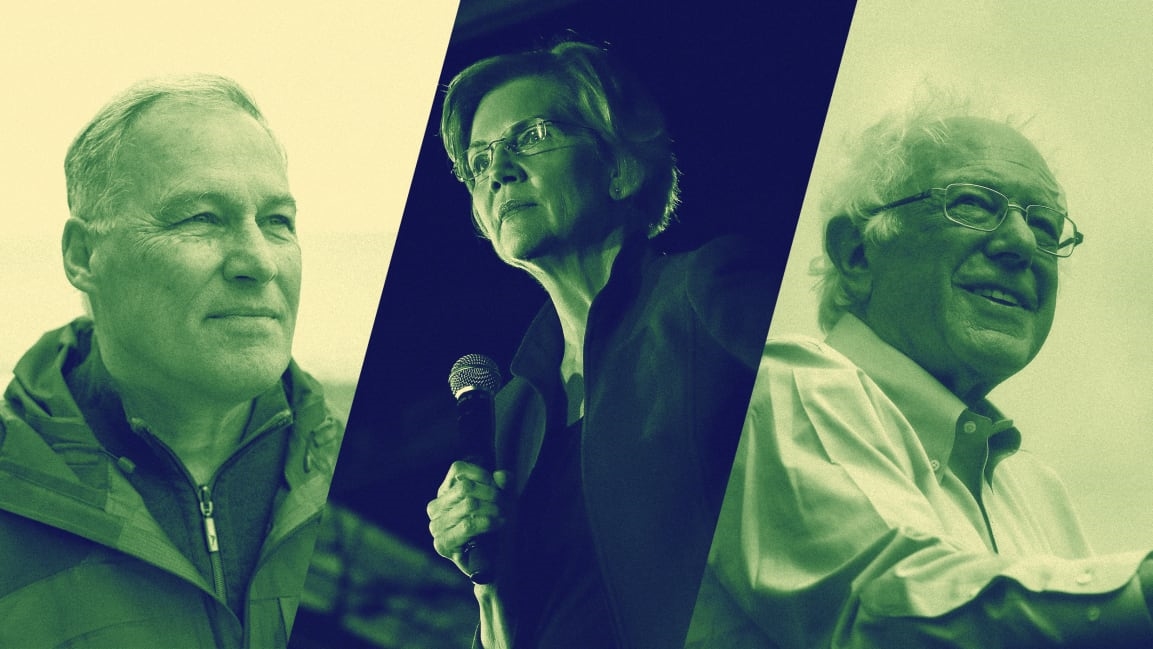The top three 2020 candidates on climate change, ranked
With one Democratic presidential debate down and the second looming at the end of July, polling among the 20 qualifying primary candidates will likely continue to yo-yo.
But when it comes to candidates’ environmental policy positions, one leading advocacy organization is already ready to list the standouts. The SEAL Awards, which honors both businesses and journalists with strong track records in sustainability leadership, has named its top three 2020 candidates in terms of environmental policy: Washington Governor Jay Inslee, Massachusetts Senator Elizabeth Warren, and Vermont Senator Bernie Sanders.
The SEAL Awards team notes that the candidates (listed in descending order of policy strength) were chosen exclusively for their environmental policies, rather than their overall platforms or candidacies. In other words: While polling indicates that both Warren and Sanders overall have a greater likelihood of being elected, the SEAL Awards believe that Jay Inslee’s environmental policy is the strongest.
That figures: Inslee has built his whole campaign around a climate change platform that spells out concrete steps for decarbonizing the economy and investing in green technology—and consequently, creating jobs and opportunity. “There’s been a lot of conversation about the Green New Deal, and underneath the Green New Deal, people seem to forget there isn’t actually a deal in place,” says Safa Bee, the SEAL Awards’ impact lead. “What Jay Inslee is doing with his campaign is basically writing a playbook for what the Green New Deal could look like with his policies.” Even if it’s unlikely that Inslee will earn the nomination, Bee says that his comprehensive approach to climate change is one that should inform whoever does and also act as a blueprint for how state and local governments should be thinking about climate action.
A panel of 20 environmental experts including academic researchers, along with six youth activists from organizations like U.S. Youth Climate Strike and Sunrise Movement, made recommendations on the candidates’ policies to the SEAL Awards. The panel considered five specific facets of climate change—agriculture and food systems, carbon and energy policy, conservation and restoration, infrastructure and transportation, and investment in green tech innovation—and how the candidates’ policies would address them. “We have this emergency, and we have to apply our thinking to the areas that are going to make the most rapid change, so what are those areas?” Bee says. Each candidate was rated on a score of zero to 20 for each of the five categories, and then assigned a total score out of 100.
But beyond that scorecard, Bee says that the panel of experts also said that these top three candidates “are ones that are not thinking about climate change as a stand-alone silo but rather are seeing everything—from foreign policy to food systems to social services—through this lens of climate change.” Social justice, she says, was another significant component. “Any candidate that is failing to connect the dots between social justice and climate change did not make the list,” Bee says. The panel was looking for candidates, for instance, who would not shy away from discussing the connection between the immigration crisis and climate change, or between wealth inequality and climate change.
Even though the discussion around climate policy was shortchanged in the first Democratic debate, the SEAL Awards team is hopeful that it will take up more airtime during round two in late July and that releasing this ranking of candidates could spur others to intensify their focus on climate change.
(40)



